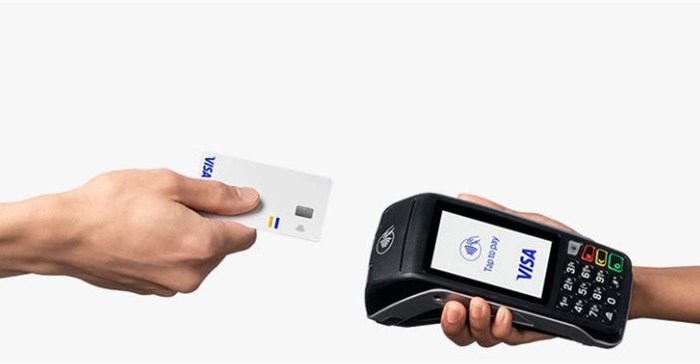This week, Visa announced its unique partnership with Loop as it onboarded its instant tap-to-pay system for the mini-bus taxi industry.

Source: Visa.
Loop founder, Imtiyaaz Riley says the goal is to improve the quality of a taxi ride, improve safety and to make payments for rides better for both the passenger and the driver.
Loop works in two ways. Commuters can sign on via whatsapp to create a wallet for payment by simply sending a message. If they don't choose the wallet option, they can tap on an accepting device with a bank card in the vehicle which also ensures payment.
Minibus taxi-fleet owner, Melton Oppelt says, “Removing cash from the system means commuters no longer have to queue to draw cash from ATMs, they have a system that allows them to budget upfront for monthly transport fees and they don't have to worry about having the right change upfront, or receiving the correct change in return.”
“It's not only about digitising through tech, it's about driving economic empowerment and financial inclusion,” adds general manager for Visa South Africa, Lineshree Moodley.
"By digitising the cash within that ecosystem you can help the owners collect their money, the drivers to collect their money and then they can start building credit profiles as well so that they can get access to loans and different types of bank accounts, and they can uplift the whole community,”
Tax compliance in the taxi sector
Oppelt is also chairman of the Mitchell’s Plain to Bellville minibus route wherein 25 minibus taxis are piloting this new digital payment system. He notes that the partnership between Visa and Loop is not only revolutionising how people pay for taxi rides but is also catalysing a broader transformation in the taxi industry – one that aligns with Sars' mission to collect taxes more efficiently and transparently.
“In the past we just had cash money floating around and we didn’t even know if we were making a profit, but now we have a balance sheet, we are decreasing our equity within the business, so things can only look good,” he says.
For too long, the taxi sector has operated on the fringes, with cash transactions that often went unreported and untaxed.
“Digitising taxi-fare payments will be a way of seeing what it is that the drivers are earning. if that amount is large enough to be tax deductible, then they must pay their share of tax. There are many taxi drivers who talk a lot but they don't want to pay tax, and we are busy fixing that. This is a business and we must be compliant,” Oppelt asserts.
A shifting tax landscape
Emboldened by its 2023 Strategic Objectives, Sars is actively pushing for greater compliance across all industries, including the taxi industry, and enforcing collection against non-compliant taxpayers.
According to its new mandate, non-compliant taxpayers may wake up to find Sars has emptied their bank balance without warning due to an ITA88 notice from Sars. Banks have no grounds to dispute ITA88 notices and must comply by attaching the taxpayer's funds, as not doing so would shift the debt liability to the bank, which no financial institution would accept.
As Loop's cashless payment system takes hold, this convergence of financial innovation and regulatory rigor is shaping a tax landscape where transparency and accountability within the taxi industry are paramount.
“We understand that about 70% of the population uses a taxi. When we look at the cash that's in the ecosystem, that’s about R90bn,” said Moodley.
Scaling up for future growth
“The challenge for us is to understand the ecosystems in which the taxis operate because we don't want to introduce a solution that doesn't work. We want to make sure that it can be adopted, that it can be scaled and that it's making the commuters’ lives and their ecosystems easier.”
The aim is to have 1000 taxis using Loop by next year, and to roll it out nationally in the near future.
Visa’s vision is to grow its acceptance devices beyond South Africa and across sub-Saharan Africa.
“We’re at a tipping point,” Visa head of urban mobility Nick Mackie said. “This isn’t just a phenomenon in a few cities. Around the world, in over 650 different locations we’re seeing that people now increasingly expect to pay using contactless open-loop payments.
"The expectations are evolving.”


































